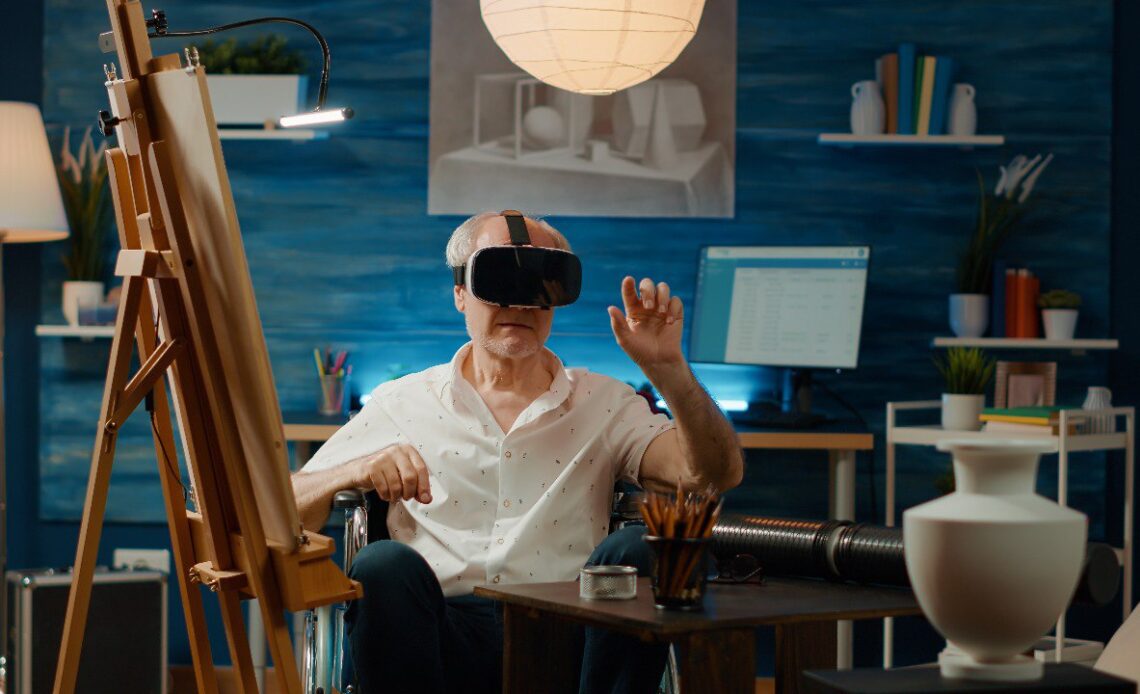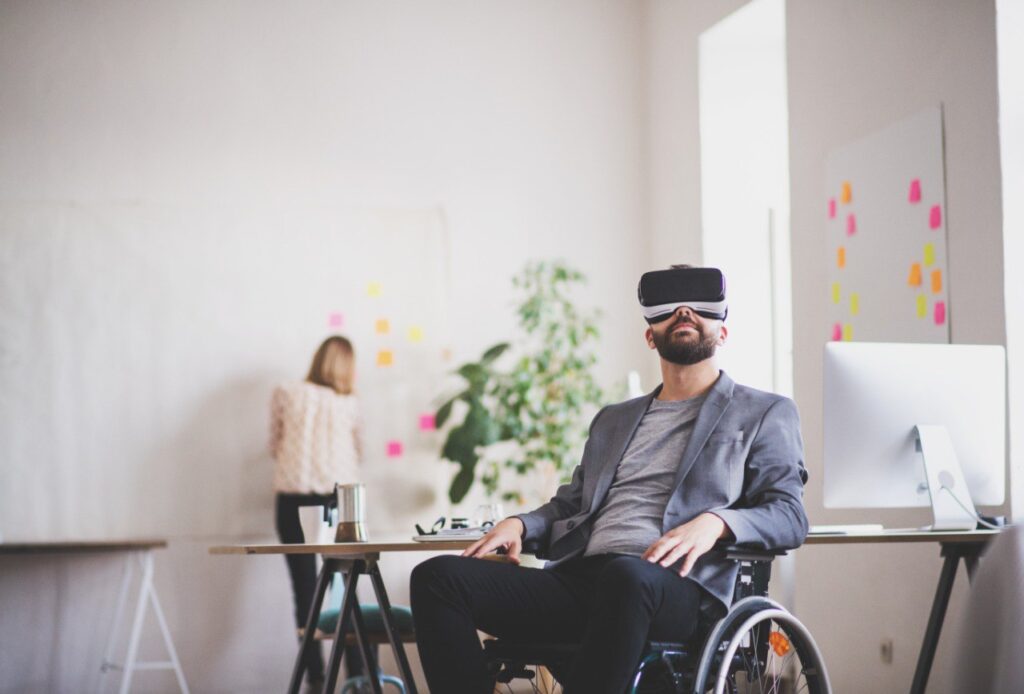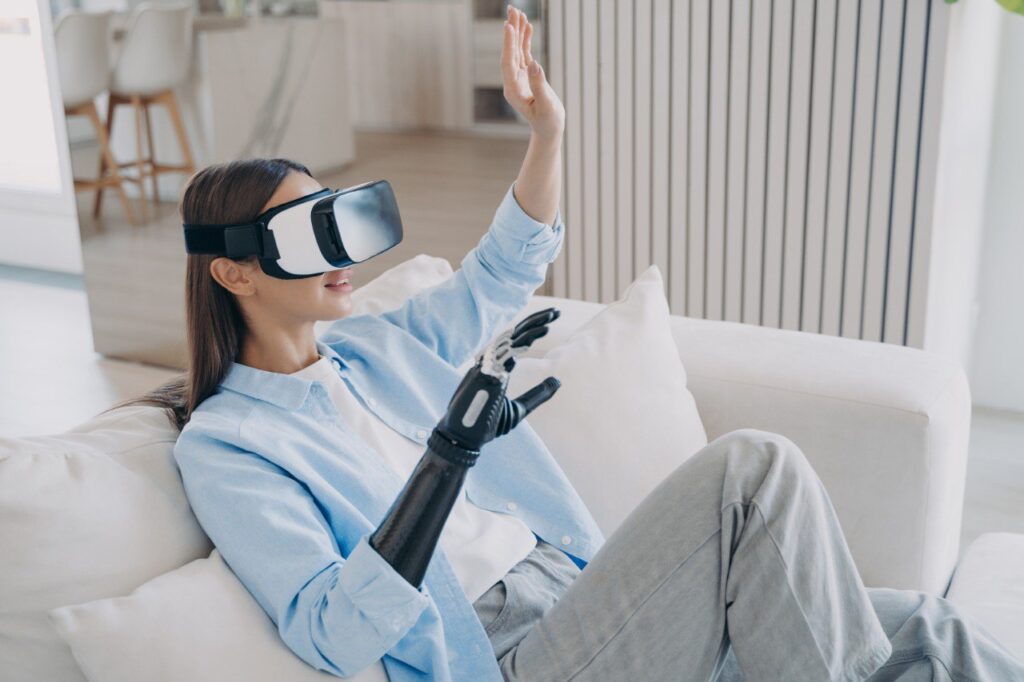
The metaverse is an incredible concept that has taken the world by storm. As a metaverse company that cares deeply about the well-being of people with disabilities, we are thrilled to see tech industry is finally embracing this fully immersive and interconnected virtual world. Thinking about the opportunities and advantages, it could offer those facing physical, cognitive, or socio-economic challenges is heartening.
Disabled people will be able to access a range of educational, social, professional, and recreational activities in a more accessible, equitable, and inclusive environment. The metaverse has the potential to level the playing field and provide the disability community with skills and income that they may not have had access to otherwise. It’s a game-changer!
Social Life
One of the most significant advantages of the metaverse for individuals with disabilities is the ability to connect with others worldwide. Using virtual platforms, people can engage with others in ways that might not be possible in their everyday life by joining communities, attending events, and interacting with them. The metaverse allows individuals to participate in social activities without the physical barriers they may encounter in the real world. Also, metaverse technology allows everyone to self-represent in a way they desire, giving freedom and creativity.
People with ASD (autism spectrum disorder) regularly experience issues communicating socially. They normalize their social skills through training that takes most of the person’s time. Virtual reality projects utilize virtual reality to re-enact social communication and assist individuals with ASD with rehearsing in a safe environment.
As the Metafluence team, we are researching the subject to make a disabled people-friendly metaverse.

Education
The metaverse provides a unique opportunity for individuals with disabilities to access education in a more accessible and inclusive way. Virtual classrooms allow students to access education from anywhere, regardless of physical limitations. Additionally, virtual environments allow for experiential learning, allowing individuals to participate in immersive simulations and interactive experiences.
Many individuals with hearing or visual impairments do not necessarily experience a complete loss of these senses. Instead, they often have some degree of partial loss that can be improved with the help of augmented reality (AR) and virtual reality (VR) applications. AR-enabled hearing aids, for instance, can identify the desired sound that the listener wants to focus on and amplify. Another example is AR glasses that can mitigate visual impairments. Additionally, many VR solutions enhance visual quality for individuals with low vision.
Work
The metaverse provides individuals with disabilities with a new opportunity to engage in work, creating more job opportunities and increasing accessibility. The pandemic has shown how quickly we can adjust to new working methods. Many people expect to work in the metaverse one way or another. With virtual environments, individuals can work remotely, removing physical barriers and creating more flexible work arrangements.
There are coders, engineers, and developers with disabilities who are looking for a more accessible metaverse and workspaces. Additionally, the metaverse provides opportunities for individuals to engage in new fields, such as virtual real estate or virtual event planning. Metafluence city metaverse is the best match for kind of activities in real estate and event planning.
Entertainment and Leisure
The metaverse offers a vast array of entertainment and leisure activities accessible to individuals with disabilities. Individuals can engage in various activities in virtual environments, such as gaming, virtual tourism, and virtual art exhibits.
Additionally, the metaverse allows individuals to participate in social activities, such as virtual parties and concerts. The pandemic brought music to the digital world in new ways, with artists from Travis Scott to Ariana Grande performing in virtual spaces. However, the metaverse offers more than just musical performances; it provides endless possibilities for virtual entertainment, including virtual cinemas, theater performances, and museum and gallery exhibitions.
Communication is the most important test for people with speech and hearing inabilities. For people with disabilities, the metaverse offers a unique opportunity to experience entertainment and travel in an accessible and inclusive environment.
Visitors can explore remote physical locations from their homes through virtual reality headsets, making travel more accessible and affordable. Many assistive innovations and wearable tech have been created to assist them with communicating better. VR and AR are expecting to take it to a whole new level. The potential of the metaverse to revolutionize entertainment and travel for people with disabilities is vast, providing fresh and exciting ways to experience the world.
Healthcare and wellbeing
The metaverse can potentially benefit individuals with disabilities regarding healthcare and well-being. The potential impact of the metaverse on the healthcare industry is significant, as it provides a powerful platform for medical education and training. For instance, extended reality (XR) simulation can be used in emergency response and mental health training. At the same time, VR and AR can support medical imaging in radiology and improve diagnostics, treatment planning, and medical research.
Telemedicine is another area of medicine where the metaverse has potential. VR can facilitate remote consultation, especially where the medical personnel is not geographically available, like in many rural regions.
However, to fully realize the potential of the metaverse in healthcare, it must be built to be accessible, inclusive, and equitable for people of all abilities and ages. This includes ensuring that the technology is easy to use and that users can represent their disability and age in a way that is meaningful to them.
This includes ensuring that the technology is easy to use and that users can represent their disability and age in a way that is meaningful to them. Additionally, challenges related to privacy, security, safety, communication, and ethical behavior must be addressed to ensure a safe and trustworthy metaverse.
In conclusion, the metaverse offers individuals with disabilities a new and exciting opportunity to engage in social, educational, work, entertainment, and healthcare activities in a more accessible and inclusive way. While the metaverse is still evolving, the potential for individuals with disabilities is vast, creating a more inclusive and equitable world for all.


